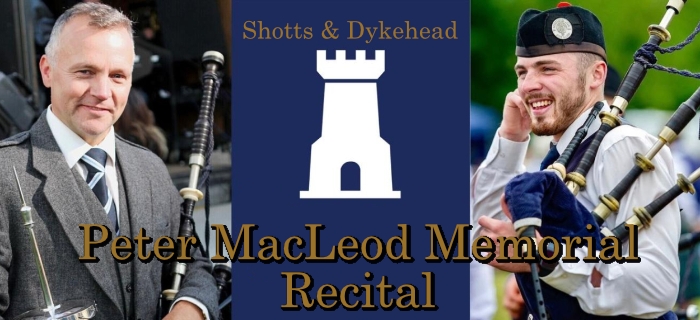
Piping trips to the US are invariably characterised by superb hospitality, friendship and good music. Last weekend, at the United States Piping Foundation Maclean Macleod Memorial, was no exception. The contest was held at the University of Delaware. The organising committee, led by Arthur McAra, Mike Rogers and Peter Kent, could not have been more accommodating. Visiting adjudicators, as I was, are given the kind of warm welcome that quickly banishes the jet lag.
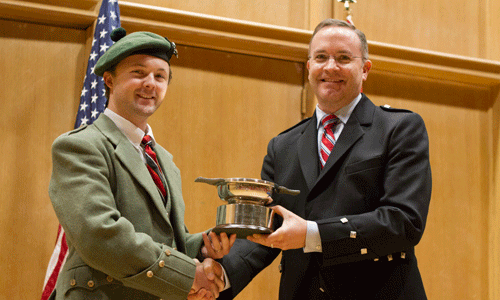
The committee run a top class event with lucrative cash prizes, good trophies and a perfect venue. Almost $6,000 is offered to competitors in the Professional class, and it is no surprise that it attracts many of the best pipers on the continent. A few years ago the organising committee took the wise decision to confine the competition to those pipers domiciled in North America. It wasn’t right that top players from Scotland on their way to this or that summer school could drop off at the USPF and fill the sporran at the expense of the locals. Once a critical mass of good US and Canadian players is reached, yes, the doors could be opened – but not yet.
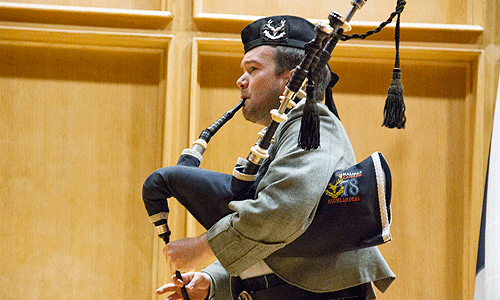
The USPF suffered a blow to its prestige a few years ago when Glenfiddich withdrew its qualifying status. But that, and the passing of founder Maclean Macleod, have not deflected them from their determination to maintain standards and do the right thing by piping. This was rewarded when the committee at the Festival Interceltique in Lorient, Brittany, selected the event as a qualifier for their MacCrimmon Trophy for this and future years. So, as well as receiving a paid round trip to Scotland, loadsamoney and quality trophies, the USPF Professional Champion gets a free, fully financed trip to the world’s foremost festival of celtic music. In total, a prize worth winning indeed.
[wds id=”8″]
Before I get to the actual performances, I should say that the USPF runs a parallel amateur contest, again with quality trophies and a round trip to Scotland for the winner – plus a bursary to study for a week at a recognised teaching institution. And all amateurs will be driven by the prospect of winning a chance to play in the professional contest in subsequent years.
But to the playing. Mike Cusack and I judged the Professional events. It was ten years or so since I had met up with Mike, now headmaster at St Thomas’s Episcopal School in Houston,Texas, and retired from solo piping competition. And if you need any reminding, his was a career marked with spectacular success at the major gatherings Oban, Inverness and London. It was a pleasure to share the bench with this master player.
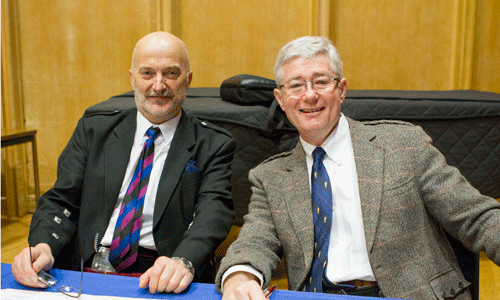
The winner of the piobaireachd was Bruce Gandy. His tune was Lament for the Children. The pipe was beautifully set, if light – lighter than we had heard from Bruce before. The playing was exemplary, the only timing flaw to my ear a tendency to bring in the gracenote after the double echoes slightly early and an over jauntiness in the ground doubling. Apart from that, this was a tune that would have taken a prize anywhere.
Second went to Andrew Carlisle with the Red Speckled Bull. A shade cautious to begin, Andrew grew into the tune, a failure to let rip in the triplet doubling our only other criticism. Bold pipe, perfectly set.
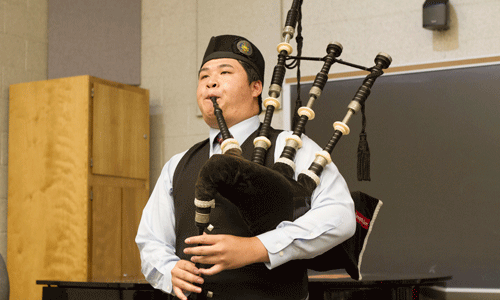
Ben McClamrock was placed third with the Lament for Ronald MacDonald of Morar. He tended to clip some of the connecting notes, especially in the T&C singlings and he pushed the doublings too much, but no error, this is a young man with a big future if he keeps up the levels of study.
A good Park Piob No 2 earned Andrew Lewis – first on – fourth. This was technically very sound playing and musically well set out. For me he overdid the slow down in the four note phrases in the last line of the urlar and there was a lack of focus on the theme notes in the T doubling. The pipe could have been brighter but maybe I was expecting too much shortly after 8am in a cool hall.
Fifth placed was Derek Midgley. He played the seldom heard Rout of the Lowland Captain. Technically very good on a full sounding, steady pipe. The tune came a little unstuck in Variation 2 where Derek couldn’t make up his mind whether to play it in twos or fours. He ended up doing neither and lost all melodic direction. To his credit he got back on the rails quickly thereafter and with his strong fingers finished in some style.
A mention in dispatches for the following:
Alex Gandy, whose Old Men of the Shells, minus the two hiharins at the end of the ground, was competently, if not totally convincingly, handled.
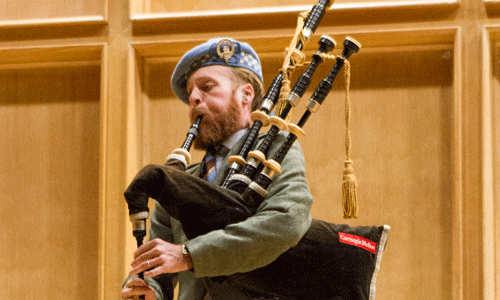
Nick Hudson, who over-tuned his pipe (sharp F), and who had a few misses and a crushed a mach; however his MacLeod of Raasay was well timed throughout.
Victor Frank, who needs to get those fingers working better than this but whose Catherine’s Lament showed a few nice touches.
Dan Lyden, who knew what to do with Hector MacLean’s Warning, but whose pipes were in need of the paramedics from the off.
James Bell, who was over aggressive in the variation doublings of an otherwise good Too Long a la John MacDonald, and he should get out of the habit of not addressing the bench when he comes on stage. (He blew up in the wings and hove into view without so much as a by your leave). He may have been nervous, but this is the wrong way to deal with the overactive neurons.
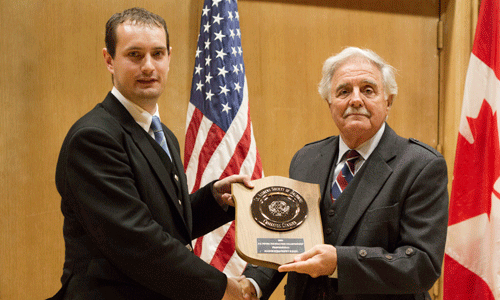
Lunch and the MSR. Andrew Carlisle won with an accurate, entertaining set on a full, resonant pipe. He rushed into the Rejected Suitor however, and could point the last part more. Have a listen:
Pushing Andrew all the way was Alex Gandy: very musical and controlled throughout. Dad Bruce was third, the Pap of Glencoe forced on a shade but very well fingered even at this high tempo; impressive birl work in the third part. Ben McClamrock and Nick Hudson took the remaining places, both hampered by a clutch of misses. More care and both pipers will be challenging the top three in years to come. Most of the others were found wanting musically and technically. My advice? Let the tempo of your tunes be dictated by your technique. Never play faster than what your fingers can handle.
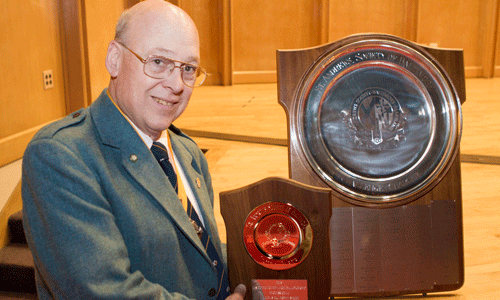
The contest concluded after ten hours of playing. Apart from one minor hiccup, the presentation of prizes was efficiently handled with a few words of thanks to the sponsors from MC Arthur McAra. They were: The Dunvegan Foundation, St Andrew’s Society of Philadelphia, St Andrew’s Society of Baltimore, Scottish Games Association of Delaware, Lyon College and the Balmoral School of Piping & Drumming. I would like to second Arthur’s sentiments. Piping in North America needs this sort of financial support if it is to continue to prosper. Thanks to decades of work by the likes of Jimmy McIntosh and his students, there is now a considerable knowledge base in the north-east US. A lot of good teaching is going on and pipers, amateur and professional, need a serious platform on which they can demonstrate what they have learned. Long may these sponsors continue to help the USPF provide just such a platform.
• The top photograph shows competitors, judges and organisers on stage at the conclusion of the day. All photographs courtesy Peter Kent.
[wds id=”11″]







